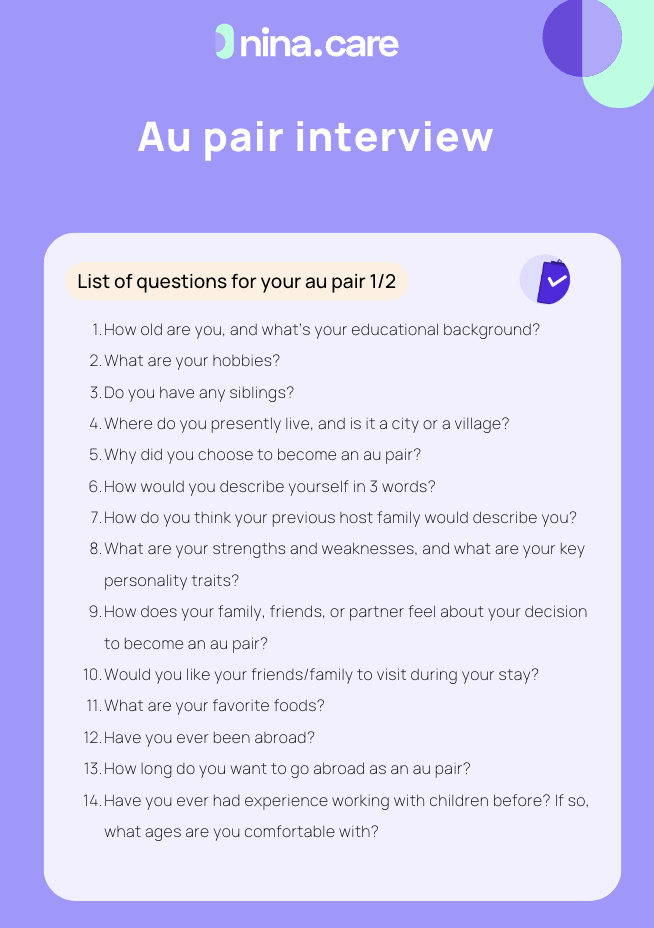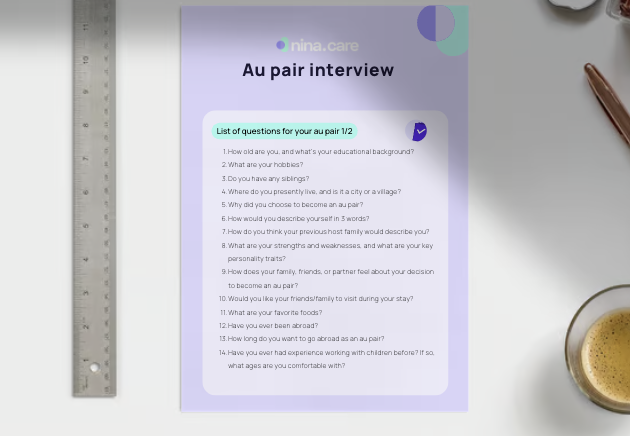Welcome to the world of au pairs, a delightful, exciting journey of finding the perfect match for your family through an au pair interview! At Nina.care, we try to make your au pair adventure as smooth as possible. Finding an au pair is easier when you have a proper plan on how to interview them.
Download our 10 questions
Guess what we’re good at? Making plans! Yeah baby, let’s dive into our top 10 interview tips to help you select the right au pair for your family! Just looking for a short list with questions?
Download the au pair interview questions right here!
Choosing your ideal au pair
Trust your intuition when reading the au pair files but remember, some might not be great at presenting themselves. Or even worse : are great at selling themselves a bit too well…

Meet out recruiters and agents @ Nina.care. if you select a candidate, our screening and recruitment team at Nina.care always also screens your au pair to make sure we use our years of experience to double check if you can have a successful au pair year will work. We pay attention to the following in our own interview: Motivation, expectation, personality, maturity and experience
Practical tips for the au pair interview
Here are some practical tips to ensure a smooth and enjoyable experience. Our digital meeting room is an ideal place to conduct an interview for a nice little conversation that typically lasts between 10 and 20 minutes. Keep in mind that your au pair can be nervous, so it’s crucial to make them feel at ease by giving them a compliment or asking about their day.
As language barriers may exist, remember to use shorter sentences and simple words if needed. In the interview, prioritize making sure the au pair genuinely loves children and discuss essential topics such as pocket money, holiday plans, and house expectations. Continue reading to find out which questions you should ask in your au pair interview!
Questions to ask during the au pair interview
Let’s go ahead and dive a little deeper, because interviewing someone is never easy, let alone someone who is going to become a real part of your family. No worries, we’ve got you! Our au pair agents have worked as an au pair or even host an au pair themselves. We know exactly how you should interview one another, and we are not gate keeping a thing. So, read on, my dear!
Getting to know one another
To start things off, you should introduce yourself. It relaxes your own nerves, because who doesn’t like talking about themselves?! And also, it puts your au pair candidate at ease. Share some fun details about your family, your hobbies, where you live, your professional life, and the amusing stuff your kids do. Once you’ve told everything you want him/her to know, it’s time to invite them to share a little about themselves.
Consider these questions to include in your au pair interview: How old are you, and what’s your educational background? What are your hobbies? Do you have any siblings? Talk about their current living situation: Where do you presently live, is it a city/village? Do you like it? And of course, don’t miss the most important one! The question of all the questions: Why did you choose to become an au pair?
Your au pairs personality
If we ask our host families what they think is the success to a great au pair adventure, they would probably say that it’s the match between the personality of the au pair and the personality of the family. Are you a family that likes to be outside, be creative and if someone were to ask, wouldn’t have a clue where and how to find the thing called Netflix? Or are you a family that sometimes counts down the minutes until bedtime and uses screen-time to rewind and reset during the day? Both is totally fine, but it’s wise to know your families’ personality, so you can look for a matching one in an au pair.
Talk about their personality traits
To get to know your potential au pair a little bit, you could open up with a simple question like ‘How would you describe yourself in 3 words?’ Following it up with ‘How do you think your previous host family would describe you?’ can give you keen insights into their experiences. You can ask about their strengths, weaknesses, and characteristics.
What about their support system?
Learn more about their support system, and try to understand their familial perspectives on becoming an au pair – ‘Do you have a boyfriend/girlfriend and if so what do they think? What do your parents think of the plan to become an au pair? Would you like your friends/family to visit?’
Before you dive in too deep, ask about their favorite foods. Who doesn’t like talking about food, right? Ask about their experience overseas with ‘Have you ever been abroad/in NL before?’ And finally, to get a feel of their commitment, ask them ‘How long do you want to go abroad?’
Experience with kids
Welcoming an au pair into your home is an exciting and most of all enriching experience for your whole family. However, most importantly, is the fit with your kids. Trusting the au pair with the children ensures a great cultural experience. Knowing how to effectively interview your au pair regarding their experience is crucial in making the right choice.
Begin by asking the au pair about their experience working with children. You can talk about the age ranges they are comfortable with, as this differs between individuals. After that, you can dig a little deeper. What did they like about their experience working with children? Ask them to share some of the activities they undertook with the kids they cared for. This will give you an insight into how they interact and bond with children.
A fun question you may not have thought of yourself, is asking your au pair candidates about their own family: Do they have brothers or sisters? Did they grow up with (small) kids around them?
You can also test their imaginative thinking! Challenge them to describe how they would entertain the children for 2 hours. This will show their creativity and energy level, both essential traits for an au pair. Maybe the au pair really likes to play with them, or maybe they see themselves more as a parent than a sibling.
Finally, ask them to share a real-life example of when they’ve dealt with children who weren’t listening or cooperating. For instance, a scenario where the kid does not want to go to bed, does not want to eat their dinner, is throwing himself on the ground when you are in the supermarket with your hands filled with groceries and your youngest crying in the stroller, oh, and you just remembered you forget your card to pay for it all – I mean, we’ve all been there, am I right?
Conducting an au pair interview, might seem daunting, but with these tips, you’ll be well-prepared to find that one perfect fit for your family. Remember, not every answer has to be perfect, it just has to feel good. Communication will be a huge part of your experience, so do not expect everything to go perfectly in the interview.

Motives of your au pair
Done with reading all the info? Make a top 3 – 5 list of the candidates that appealed to you the most. Having difficulty deciding who you like best? Let’s grab a pad and create a fun list! On the right hand, jot down your most important expectations and on the left, put the profiles that match (most of) them. Are there a few that seem to hit the mark? Then those are the best fit for your family.
Interviewing anyone is like opening a new book, you never know what you’re going to find inside! Usually, it’s not that important, but if the interviewee is going to live with your family, you need to know what rocks their boat! We love to help you turn these pages by providing useful tips on how to effectively interview an au pair. Learn more on how to ask about their motives! You know what? These questions would also work as a fun convo-starter on your next date-night, enjoy!
Dive into their passions
Uncover their passion by asking, ‘What is something that really makes you happy?’ It tells you a little about their hobbies and interests, which they might (hopefully) share with your children.
Do not forget to ask about someone’s hopes and dreams as a kid! It says a lot about them. The answer to ‘What did you want to be as a child?’ can reveal their inner passions and perhaps a fun side too. The same goes for the reason behind their academic decision, it can offer valuable insights into their ambition and drive. So ask, ‘Why did you start doing the education that you are doing?’ Follow up with ‘What do you want to do after your au pair experience?’. This reflects their long-term goals and helps you assess if their plans align with your family’s needs.
Social skills
You are of course evaluating their social skills in an interview, but it is also a great idea to ask about it. The answer to ‘What do you really value in your friends?’ can shine a light on their ability to create meaningful relationships, an important aspect for an au pair, since an au pair adventure become quite lonely at times.
Religion and beliefs
Make sure you and your au pair do not have opposite beliefs about important stuff. You could ask a question like ‘What do you believe in that many other people don’t?’, to really get to know what their beliefs are.
You could also ask about their religion, as it could be an important part of their life. The answer to the question ‘Do you have a religion?’ could potentially influence the way they approach childcare. Keep an open mind and ask open questions if you’d wish to know more. Don’t forget, they are interviewing you too!
Expectations of au pairing
Get straight to the point. Ask bluntly, ‘What do you think au pairing will actually be like day-to-day?’ Follow that up with a question on their leisure time. ‘With free time to explore, what do you plan to discover?’
Then, and please do not scare them, ask if they like to cook. You could specify and ask them what they like to cook, if they want to help in the kitchen or if they like to do it themselves. What do they expect from you?
Vroom, vroom! Let’s talk about driving. You can ask them about their driving experience and if they’re comfortable driving kids. Maybe they’d love to drive the whole family to the South of France, who knows! Speaking of vacations, how about family trips? Ask if they’re game to join you guys for some family holiday fun.
An important question for a lot of parents, is if the au pair is a smoker or not. You can definitely ask them! Try not to judge if they do and swiftly move one to their dietary preferences, ‘What do you like to eat, snack or have for breakfast?’
If you have pets in the home, it’s important to ask them if they’re animal-friendly or if they are afraid. Oeh! Do not. I repeat: do not forget to ask if they are allergic to animals! It would be quite devastating if someone were to forget to mention a dog allergy and the au pair has to go! Or the furry family dog. Both horrible.
Prep the arrival of your au pair
So, the au pair interview went amazing and it’s a match! Fan-tas-tic! Umm.. What now?
Waiting for the arrival of your new au pair can be a little awkward, what do you do? Fear not, my friend, we will help you prepare, so it’ll be a smooth transition for both parties involved. You should definitly begin by maintaining regular communication with your au pair through email or chat prior to their arrival. This will create a bond and make them feel welcomed. Send them funny videos, a book or movie recommendation, a recipe or videos of pics of the children.
Secondly, prepare their room ahead of time. This space should be comfortable and inviting, as it will serve as their personal sanctuary within your home. Try to put yourself in their shoes. How scary it must be to live with a family you don’t know! Make sure you put your heart and soul into it. How about a cute welcome package?
We will also provide you with a template to help you create a well-thought-out weekly schedule. This is not just a requirement, but a tool to help manage expectations and assign tasks effectively. Don’t worry, we’ll be sending the template later on in the process.
Lastly, think about a “welcome” program for the au pair’s first few days and weeks. This will help them get to know the kids and their new surroundings. You could take them around the local area or places the kids love to go. Oh and please note that you cannot leave the au pair with the children independently for the first three days after arrival.
A well-prepared welcome can make all the difference in ensuring the best au pair experience!

Meeting your au pair
Remember, meeting your au pair is typically far more intense for them than for you. They’ve likely traveled for a long time already and are dealing with the emotional impact of leaving home for an entirely new year in an unfamiliar place.
You can start making them feel at home, during the au pair interview. Let them know it’s understandable that they may be tired or jet-lagged when they arrive. Just welcome them and give a short introduction to the kids, try to not make it too long. Let your au pair retreat to their room for a bit of rest or to freshen up.
Offer comfort and familiarity
Your au pair is probably starrrving! You could help them out and lay some packaged foods or beverages on their bed. These snacks can serve as a source of comfort when late-night hunger pangs or thirst strike due to jet lag, but they’re not comfortable enough to ask or get it themselves.
Let them know what time you expect them to have breakfast, lunch, or dinner based on their arrival time. Also, be sure they know what time you expect them the following day. This will help with the jet-lag and setting expectations is always a great start.
Communication, communication, communication
Clear communication is key! I’ll say it again for the ones in the back: Communicate, communicate, communicate! Do not expect them to know what you want, when you haven’t explicitly told them. Reinforce pieces of information by asking them to rephrase in their own words. Give compliments when they do something right, but don’t hesitate to provide immediate correction or feedback when necessary. This will prevent misunderstandings and make way for a better collaboration in the long haul.
One way of ensuring clear communication is trying to follow the daily schedule. This will ease the au pair into a routine and help them adjust. Aside from that, it’s very important to have realistic expectations. The first month can be overwhelming for au pairs, especially those from different cultural backgrounds – think of it as a survival phase. They require time to settle down and adjust to your family and the new country. Give them that time and try to view things from their perspective.
Homesickness
Watch out for signs of homesickness after about three months. Think of difficulty in sleeping, headaches, apparent sadness, stomachaches, or loss of appetite. Encouraging the au pair to talk about what they miss about home can be super helpful, and remind them that homesickness is very normal!
Additionally, motivate the au pair to engage in activities and establish new friendships. If, down the road, you notice signs of extreme homesickness, let us know immediately. The au pair training guide every au pair receives has extensive details on how to cope with homesickness effectively.
List with all au pair questions for your interview
Wouldn’t it be nice to have a list with all the questions you can ask your au pair? Yes, it would! That’s why we have created such a list. Check out our au pair interview questions right here and keep it as a cheat sheet during your interview, so you won’t forget a thing.
Congratulations!
Congrats on being a well-prepared host! You’ve just finished a lengthy mix of interview questions and expectation management to get ready for an amazing au pair adventure.
Thank you for reading the whole thing and here’s to finding your perfect match – the Mary Poppins to your little ones, the newest addition to your family postcards!



